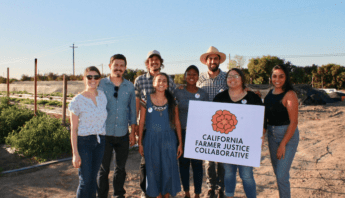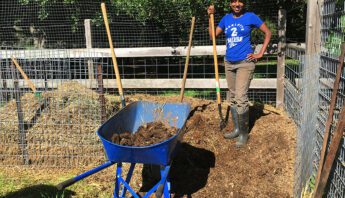“Socially Disadvantaged Farmers and Ranchers” play an increasingly important role in food & farming system
For Immediate Release: October 9, 2017
Sacramento, California – Earlier today, Governor Jerry Brown signed legislation that would require California officials to focus on and address the challenges facing farmers of color in the state by making access to state and federal resources more equitable. This comes at a critical moment as the current generation of farmers is retiring and new farmers are increasingly represented by people of color, including immigrants and refugees.
“While historic discrimination won’t be solved overnight, the Farmer Equity Act opens the door requiring that state officials identify and address the ways farmers of color, including black farmers, have largely been ignored,” said Dr. Gail Myers, PhD, co-founder of Oakland-based Farms to Grow, and a leading member of the California Farmer Justice Collaborative.
The Farmer Equity Act, AB 1348, authored by Assemblymember Cecilia Aguiar-Curry (D-Winters), directs the California Department of Food and Agriculture (CDFA) to better provide resources, outreach, technical assistance, and decision-making power to “socially disadvantaged farmers and ranchers,” so called because they have been subjected to historic racial discrimination.
“California’s agricultural prosperity is tied to the success of our socially disadvantaged farmers and ranchers. They deserve a voice in our state’s agricultural future,” said Assemblymember Aguiar-Curry. “The Farmer Equity Act is an important step that will help to ensure that.”
For years, farmers of color have been subject to discriminatory practices in agriculture: from being denied land ownership in the early 19th and 20th centuries, to receiving less in government loans compared to their white counterparts. These historic struggles have led to the codification of “Socially Disadvantaged Farmers and Ranchers” by the US Department of Agriculture (USDA) in the 1990 Farm Bill to provide better outreach and assistance to underserved farmers and ranchers.
While efforts at the federal level have largely focused on grants and some outreach, the California bill will take a holistic perspective across the CDFA, including how it creates new rules, forms governance committees, and manages grantmaking programs.
“From land to loans and knowledge dissemination to seed restoration, racial discrimination is not only an issue for history books, but permeates the daily lives of farmers,” said Mai Nguyen, a Sonoma County farmer and leader of the Asian-American Farmers Alliance. “Farmers of color need to be represented in state policy-making so that we can advocate for our needs, and access resources to meet them, rather than have others tell us what we need.”
AB 1348 will add the federal definition of “Socially Disadvantaged Farmers and Ranchers” and “Socially Disadvantaged Group” to the California Food and Agriculture Code: defined as a group whose members have been subjected to racial, ethnic, or gender prejudice because of their identity as members of a group without regard to their individual qualities. These groups include people who are African American, American Indian, Alaskan native, Hispanic, Asian-American, Native Hawaiian, and Pacific Islander.
California leads the nation in the diversity of its farmers and ranchers. Between 2007 and 2012, census data show that California experienced the largest increase of Asian-American farmers of any state, with over 3,500 producers. Today, California ranks third in the nation in concentration of Latina/o farmers. While the number of California farms overall decreased by 3.9% from 2007 to 2012, the number of Latina/o-operated farms simultaneously increased by 8%. Twelve percent of all California farms were operated by 9,815 Latina/o farmers, while only 3% of farms nationwide were operated by Latinas/os.
Despite this significant growth, farmers of color tend to earn less money on average and receive 36% less in government funding than their white counterparts. Support programs critical to farm survival also exhibit limited reach to farmers of color. While 35% of non-Hispanic farmers acquire crop insurance, for example, only 10% of Hispanics are enrolled in USDA insurance programs, and just 1% in Monterey County. Insurance is critical for undercapitalized and beginning farmers who are most vulnerable to market and/or crop failures.
The new law will also ensure farmers of color in our urban centers are not overlooked—another growing demographic of farmers crucial in providing food in places where fresh fruits and vegetables can be difficult to find.
“Let the passing of the Farmer Equity Act be beginning of a much overdue action toward justice for those passed over by the present food system. Fresh produce is not easy to come by in many neighborhoods across California. Urban farming has a real chance to ‘transform the hood for good’,” said Chanowk Yisrael, founder of Yisrael Family Farms in Sacramento’s Oak Park neighborhood.
The Farmer Equity Act also directly responds to California’s climate-smart investments in agriculture. Farmers in underserved areas of the state suffer some of the worst impacts of climate change and local environmental pollution. This legislation will increase access to “climate smart” technical assistance among small and mid-size farms.
“We believe that socioeconomically disadvantaged growers who operate diversified farms are some of the most valuable players in adapting to a changing climate,” said Janaki Jagannath, a California Farmer Justice Collaborative leader. “A goal of this legislation is that climate-smart agricultural policy incorporate the voices of farmers of color in state policy-making and expand their opportunity to access climate adaptation programs, services, and markets.”
Contacts:
Chanowk Yisrael, Yisrael Family Farm, 916-955-4655, chanowk@yisraelfamilyfarm.net
Paul Towers, PAN/California Farmer Justice Collaborative, 916-216-1082, ptowers@panna.org
Mai Nguyen, Asian-American Farmer Alliance, 619-300-8969, mai@farmermail.com
###






